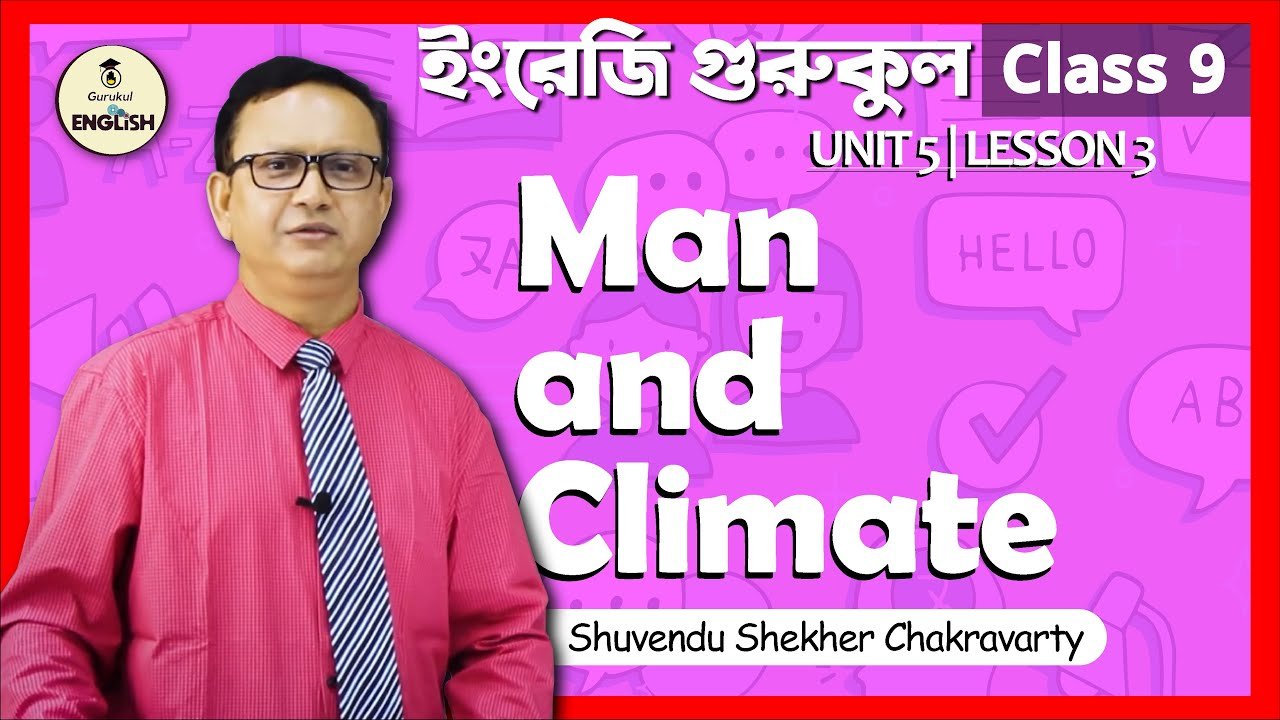Man and Climate This video is about the “Man and Climate” academic class of Class 9 – 10 English. The lesson consists of Class 9 10 SSC, English 1st Paper, Unit 5, Lesson 3. This class is useful for students who are preparing for the SSC exam.
Man and Climate
A. Discuss the questions in pairs.
1. Can man influence the climate? If the answer is yes, explain how.
2. Which human activities are responsible for increasing carbon dioxide in the atmosphere?
3. How can trees help save our environment?
Now read the text below and find answers to the above questions.
Humans can neither change the sun’s radiation nor the earth’s orbit around the sun. But they can control the increase in the amount of greenhouse gases and their effect on the atmosphere. Only during the last hundred years, the carbon dioxide concentration has been raised alarmingly in the atmosphere and we humans can be held responsible for this.
The main cause of the increase in carbon dioxide levels in the atmosphere is the burning of fossil fuels. Since the end of the 19th century, industrial activities increased rapidly giving rise to many factories. These factories required energy, which was produced through the combustion of coal. Besides coal, other sources of energy such as mineral oil and natural gas were also burned to heat our houses, run cars and airplanes, or produce electricity. Nowadays, about 85 million barrels of crude oil are burned daily.
Every time a fossil raw material is burned, it releases carbon dioxide into the air. Therefore, it is clear that more and more greenhouse gases like carbon dioxide are being generated worldwide by humans. Moreover, we are also strengthening the greenhouse effect by deforestation, which means cutting down trees. Every year enormous areas of forests are destroyed by people to obtain wood and to clear regions for mining and to create pasture. This loss of the forest causes dual problems.
Trees that are burned up release large volumes of carbon dioxide gas into the air. On the other hand, as forests absorb a lot of carbon dioxide from the air and deliver oxygen instead, we also destroy an important storehouse of carbon dioxide when we clear forests.
B. Read the statements below and say if they are True/False. If false, give the correct information.
1. Fossil fuels are burned at an alarming rate due to industrialization.
2. Coal is the only fuel used for generating energy.
3. At present, nearly 85 million barrels of crude oil are used weekly.
4. Deforestation is caused by nature.
5. Forests help consume carbon dioxide gases from the air.
C. Match the meanings in column B and the words/phrases in column A.
| A | B |
| 1. Sun’s radiation
2. Fossil fuels 3. Combustion of coals 4. Crude oil 5. Raw materials 6. Deforestation 7. Photosynthesis |
a. energy that is transmitted from the sun in the form of rays or waves or particles b. the process used by plants to convert light energy captured from the sun to chemical energyc. a basic material or substance used in the production or manufacturing of goodsd. non-renewable sources of energy that come from the remains of plants and animals e. intentional destructions or removal of trees and other vegetations for agricultural, commercial, housing or firewood use f. a naturally occurring, unrefined petroleum product that can be refined to produce usable products such as diesel, gasoline, heating oil, jet fuel, kerosene, etc. g. burning of coal usually in industrial plants. |
D. Write a letter to the Editor of a newspaper expressing your concern about growing deforestation in your area. Describe how deforestation is changing your environment. Also suggest what actions could be taken to stop cutting down trees. Follow the clues below.
- dangers caused by deforestation
- increase of carbon dioxide in the atmosphere
- the greenhouse effect
- making people aware of the adverse effects of deforestation
- making an action plan to stop deforestation
Details about Man and Climate – English Grammar :
